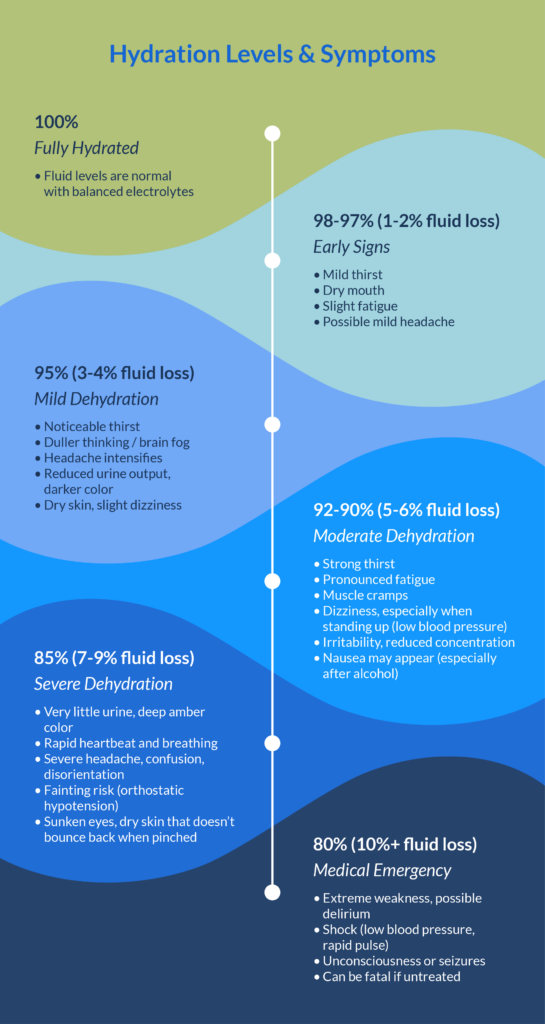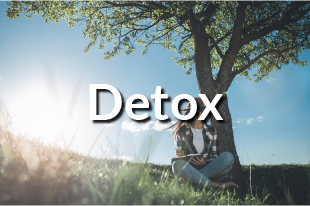Do you experience headaches after drinking alcohol? Perhaps you wake up the next day with a dry mouth or fatigue. All of these symptoms may be the result of dehydration experienced when drinking alcohol. Individuals who drink alcohol frequently can experience worsened symptoms over time. If you or a loved one are suffering from alcohol addiction, it’s important to stay hydrated throughout recovery while letting the body heal from frequent and heavy alcohol abuse.
Does Drinking Alcohol Dehydrate You?
Alcohol dehydrates the body by removing fluids in the blood through the renal system. Oftentimes, those suffering from alcohol abuse don’t stay hydrated enough for their level of alcohol consumption. Alcohol is a diuretic, meaning it increases the production of urine through the kidneys. The dehydration caused by too much drinking is often the cause of hangovers after periods of heavy consumption.
Alcohol interferes with the body’s ability to hold fluids through kidneys and the antidiuretic hormone (ADH). When drinking alcohol, the alcohol blocks the release of ADH from the pituitary gland, preventing ADH from signaling the kidneys to reabsorb water back into the bloodstream, as opposed to urinating. Without this signal, the kidneys release water and cause your body to urinate more frequently, losing fluids in the body that could be used in the bloodstream. This can lead to serious dehydration.
Alcohol Dehydration Reaction in the Body
Many of the symptoms that individuals experience during heavy periods of drinking are related to dehydration. Hydration is essential for the body to function properly. Without proper hydration, problem after problem may arise. Those symptoms can worsen if the body is unable to replenish the hydration. Those suffering from alcohol abuse, especially, are putting their body at risk of worsened symptoms of hydration.

Alcohol dehydration is the cause of several symptoms of heavy drinking, including:
- Dry mouth
- Dizziness
- Fatigue
- Headaches
- Dry skin
- Dry throat
- Muscle cramps
The best way to relieve these symptoms is to stop drinking immediately and hydrate with both water and electrolytes. Those who binge drink more frequently may experience prolonged and worsened effects of dehydration. In addition, individuals with alcohol use disorder (AUD) often experience dehydration during the withdrawal period when they seek treatment from a detox program or alcohol addiction treatment program.

The Importance of Hydrating During Detox
Individuals going through alcohol withdrawal often experience dehydration. During detox, it’s important to maintain hydration levels and monitor electrolyte balance. This can help alleviate symptoms of withdrawal that occur during detox, while also healing your body from dehydration.
The first week after quitting alcohol is when most individuals suffering from alcohol addiction experience dehydration. This has a lot to do with the nausea, vomiting, and diarrhea also experienced during withdrawal. Maintaining hydration during detox is also an important way to reduce the risk of experiencing delirium tremens, as that is commonly caused by an imbalance in electrolytes. In addition, nutrient deficiencies are also commonly linked to issues with dehydration during alcohol withdrawal.
Maintaining and monitoring levels of hydration in the body can help an individual immensely as they go through the struggles of alcohol detox.
How to Recover from Alcohol Dehydration
There are plenty of steps you can take to recover from alcohol dehydration:
- Drink water: Replenish the fluids in your body after heavy drinking helps alleviate dehydration
- Replenish electrolytes: Your body lacks electrolytes during periods of heavy drinking. This can help alleviate and prevent symptoms of alcohol dehydration
- Eat hydrating foods: Fruits like strawberries and watermelon are high in electrolytes and water. Vegetables like cucumber and celery are also high in water. In addition, hydrating foods tend to be nutrient-rich, helping replenish nutrient deficiencies after drinking
- Balance blood sugar: Alcohol can cause crashes in blood sugar that worsen fatigue. Balanced meals like protein, complex carbs, and healthy fats are crucial to balancing the body
- Rest: Quality sleep helps the body restore fluid balance and recover from the stress that alcohol can put on both the kidneys and liver
If you are concerned about frequent dehydration from heavy drinking, it may be time to seek help from an alcohol addiction treatment program. Recovery through these programs, as well as detox programs, are monitored by both health professionals who can help ensure that your body is hydrated and recovering well from bouts of dehydration.









